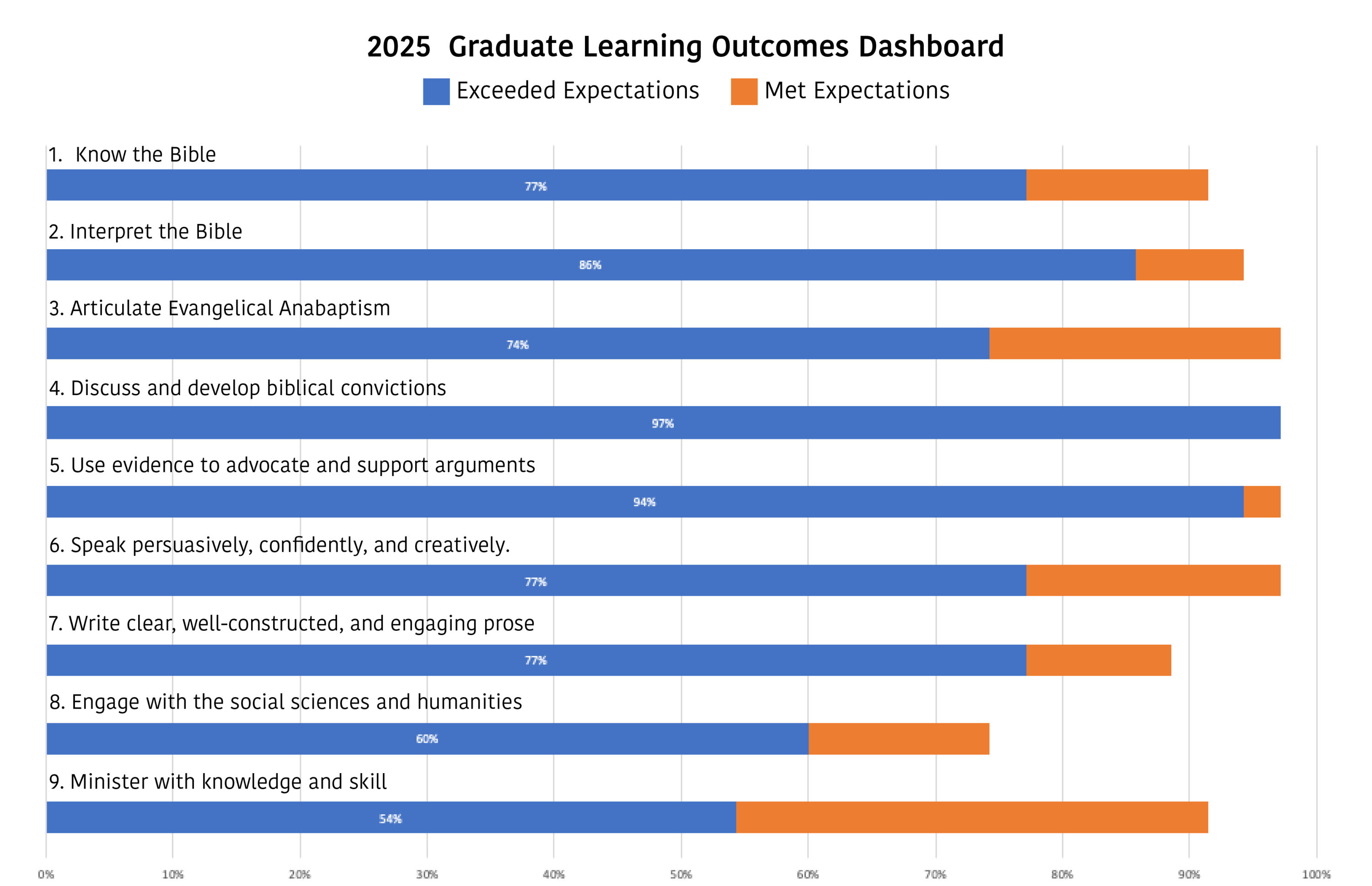Institutional Effectiveness
A selection of resources for evaluating RBC’s effectiveness according to our mission, goals, and regulatory requirements.
Click edit button to change this text. Lorem ipsum dolor sit amet, consectetur adipiscing elit. Ut elit tellus, luctus nec ullamcorper mattis, pulvinar dapibus leo.
Retention Rates
Retention Rates are based on IPEDS reporting definitions
Fall 2019 Cohort 63% Retention
Fall 2020 Cohort 70% Retention
Fall 2021 Cohort 78% Retention
Fall 2022 Cohort 78% Retention
Fall 2023 Cohort 87% Retention
Graduation Rates
Graduation rates at Rosedale Bible College are slightly below average for completing within 150% of normal time, but well above industry minimums. Graduation rates are calculated based on the incoming cohort in each fall semester. See the following table.
| Year | Total Fall Cohort | 2-yr Completers | 3-yr Completers | Total Completers | Graduation Rate |
| 2018-2019 | 21 | 13 | 2 | 15 | 71% |
| 2019-2020 | 29 | 16 | 1 | 17 | 59% |
| 2020-2021 | 32 | 18 | 18 | 56% | |
| 2021-2022 | 31 | 21 | 21 | 68% | |
| 2022-2023 | 27 | 19 | 1 | 20 | 74% |
| Multi-Year Aggregate | 140 | 91 | 65% |
Mission Statement of Rosedale Bible College
Our vision—To become a primary learning destination for preparing Kingdom workers.
Our mission— RBC exists to prepare Kingdom workers through:
- Collegiate Biblical education.
- Personal relationships formed in the context of an authentic community.
- Experiential learning opportunities and skill development.
- Spirit-led prayer, worship, and devotional Bible reading.
Core Values
- The Word of God. We are committed to the belief that the Word of God is powerful and life-giving through the ministry of the Holy Spirit (Hebrews 4:12; II Timothy 3:16-17).
- The Gospel Message. We are committed to the truth of the Gospel message.
- Evangelical Anabaptism. We are committed to a theological perspective of Evangelical Anabaptism because it reflects the teaching and revelation of Jesus Christ.
- Partnerships. We are committed to partnerships with local congregations of the Rosedale Network of Churches and beyond.
- Academic Excellence. We are committed to academic excellence for the glory of God.
- Community. We are committed to a nurturing, authentic Christian community.
- Cultural Engagement. We are committed to equipping people to engage the broader culture with the Gospel.
Goals Of Rosedale Bible College
- Students will develop a deep understanding of the Bible as the authoritative Word of God.
- Students will gain a command of Scripture and theology, learning to live faithfully in the Kingdom of God.
- Students will learn to think critically and communicate ideas effectively.
- Students will develop practical ministry skills.
- Students will grow in their love for Christ, becoming a contributing member of a local church.
General Objectives of the Associate Degree in Biblical Studies
The degree program is designed to develop the core components of Biblical understanding, a Biblical worldview, global vision, and commitment to evangelism. The program provides students with a balanced sequence of courses from the three major course divisions: Biblical/Theological, Church/Vocational, and General Studies. Students may choose a general studies approach to develop relevant skills in specific areas of interest, or they can choose a concentration in business and leadership. After completing this program the student will be able to:
• Articulate a basic knowledge of the Old and New Testaments.
• Apply informed interpretive principles to the study of the Bible.
• Articulate an evangelical Anabaptist faith perspective consistent with the theology of the RNOC and the faculty of RBC.
• Reflect on, discuss, and develop Biblical convictions about faith and ethics.
• Advocate and support arguments with compelling evidence, sound reasoning, and generosity.
• Speak persuasively, confidently, and creatively.
• Write clear, well-constructed, and engaging prose
• Engage with the social sciences and humanities by practicing close reading, careful analysis, and critical thinking.
• Apply knowledge and skills for ministry gained through serving in a variety of settings.

To learn more about the research behind these numbers, see the Summary Description Narrative and the Embedded Assignment Narrative.


